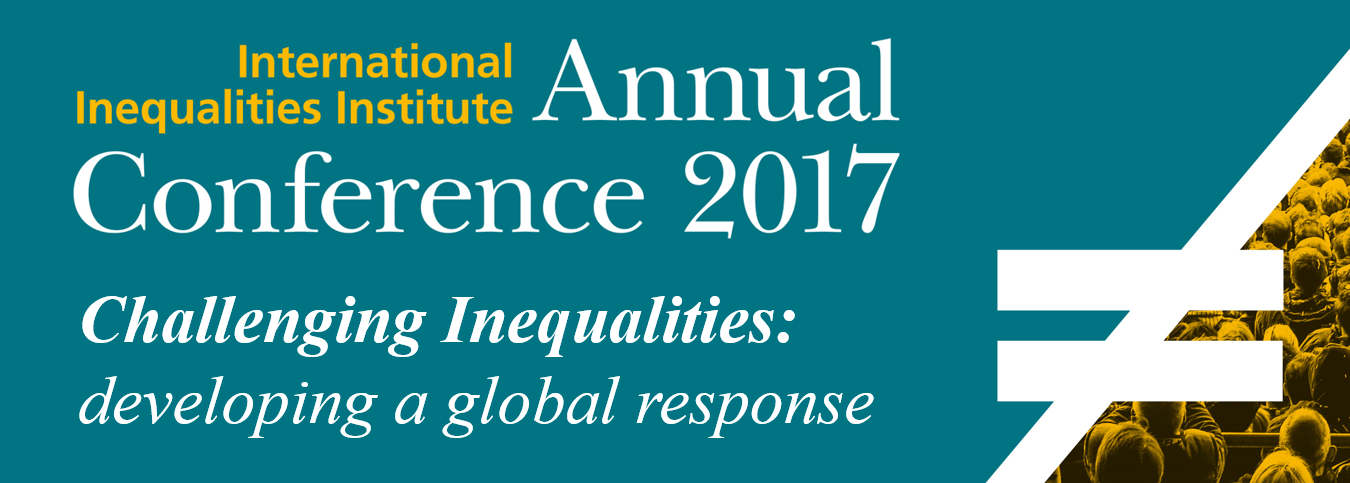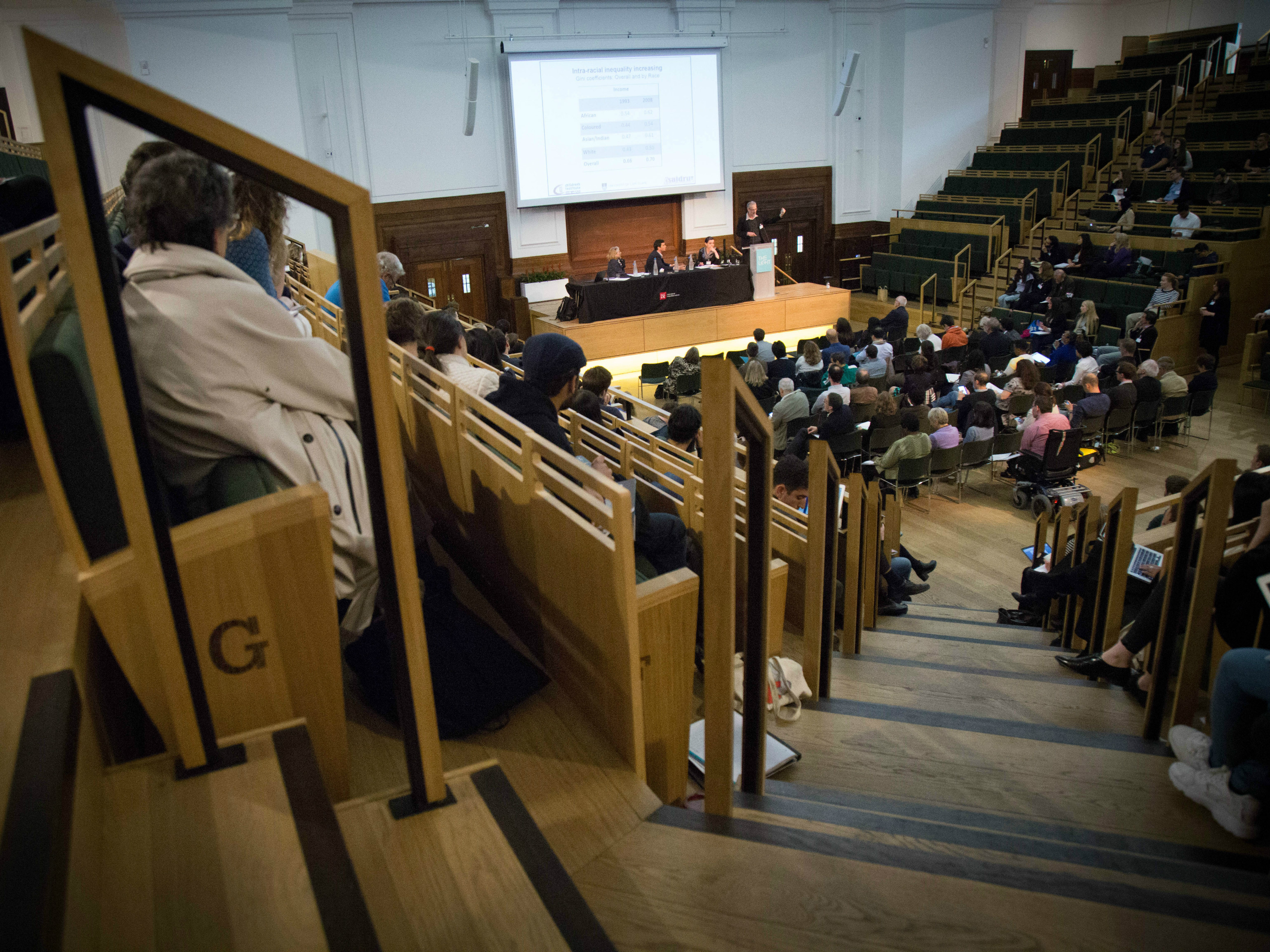Inequalities have, over the past few years, risen to the top of the academic research agenda with the work of Tony Atkinson and Thomas Piketty. This research is increasingly relevant at a time when global politics seem to be turning away from building cohesive societies. The III works to bring together the world class research efforts taking place at LSE and beyond, informed by great work taking place in the third sector and other professions, and to discover what can be done to reduce inequalities.
The III Annual Conference 2017, entitled Challenging Inequalities: developing a global response looks to highlight the work of the Institute and of the embedded Atlantic Fellows programme, which - over the next 20 years - is building a 600+ strong community of motivated international leaders in the fight for greater equality.
Key speakers from academia and the third sector will discuss concepts around racial, health, social and economic equity, alongside presentations from upcoming researchers and the presentation of the Action for Equity Award by George Alagiah, BBC. The conference will be followed by an evening debate which will explore how to ‘change the terms of the debate’ around inequalities.
Book a ticket for the morning session
Book a ticket for the afternoon session

CONFERENCE TIMETABLE
09.30-09.50 - Registration and welcoming comments by John Hills
Morning session
10.00-11.30 - Social and economic mobility - are destinies diverging?
Speakers: Professor Jane Waldfogel (Columbia University), Professor Mike Savage (LSE), Anna Ludwine (Eurofound), Faiza Shaheen (Centre for Labour and Social Studies)
Chair: Professor John Hills (LSE)
The topic of social mobility attracts huge academic, political and media interest. There is extensive social scientific research testifying that there are major – possibly intensifying - structural processes which limit mobility across numerous axes. This session will offer cutting edge reflections both on trends in social mobility in the USA, Europe and the UK. Contributions will look at how changing educational investments by parents are affecting achievement gaps; at how social mobility between generations is declining in some countries but not in others; and at how deep structural divisions in life chances play into populist and nationalist political repertoires. The evidence raises the question of how should societies should respond?
11.30-11.45 - Break
11.45-13.00 - From Ideas to Practice: new frontiers in research
Presentations by PhD students and Visiting Atlantic Fellows
Speakers: Kerris Cooper (LSE), Refilwe Lepelle (UCT), LIsa Windsteiger (LSE), Dr Will Bartlett (LSE), Professor Naila Kabeer (LSE), Dr Abigail McKnight (LSE), Dr Michael McQuarrie (LSE)
Chair: Professor Alan Hirsch (UCT)
13.00-14.00 - Lunch
Afternoon session
14.00-15.30 - Othering and Belonging: race, poverty and disability
Speakers: Professor john a powell (University of California, Berkeley), Baroness Lister of Burtersett (House of Lords and Loughborough University), Liz Sayce OBE (Disability Rights UK)
Chair: June Sarpong
A powerful force in defence by the privileged of existing inequalities and the status quo is to present and understand those who are disadvantaged as in some way ‘other’, different from the majority group, as ‘them’ rather than ‘us’. This potentially dehumanising process shapes personal and social perceptions of societal realities. This session will explore how this affects debates around race and ethnicity, poverty and disability. How can such beliefs and narratives be challenged successfully? What are the potential roles of leadership in changing how issues are debated, of using human rights approaches to defend and build respect for groups that are stigmatised or excluded, and of campaigning to change perceptions, challenge people’s assumptions and celebrate diversity?
15.30-15.50 - Break
15.50-17.00 - Health Equity: barriers and opportunities
Speakers: Dr Chuck Collins (Institute for Policy Studies), Dr Mvuyo Tom (Tekano and Atlantic Fellows programme for Health Equity in South Africa), Anne Rathbone and Simon Duncan (Boingboing)
Chair: Dr Aaron Reeves
This session looks at different aspects of health equity and inequalities in countries where economies, societies and politics are very different, but where many of the links between people’s health and wide inequalities are similar. In the USA the introduction of ‘Obamacare’ represented a major expansion of health coverage to people previously excluded from it. What then are the equity implications of its promised repeal and of different versions of ‘Trumpcare’ now at the centre of fierce debate? In South Africa, the starting point is very different in terms of health systems and incomes, but are the fundamental factors driving health differences similar? What can be done to promote health equity, given this background? Similarly, in the UK, what can be achieved by initiatives on the ground that challenge inequalities and promote resilience, bringing together researchers, practitioners and people who have experienced vulnerability themselves?
17.00-17.20 Action for Equity Award presentation
Speakers: Professor John Hills, George Alagiah (BBC and chair of the Action for Equity Award jury), Chris Oechsli (Atlantic Philanthropies)
17.20-17.30 - Closing remarks
17.30-18.30 - Reception
Evening public debate
Inequalities: changing the terms of the debate
Speakers: Jee Kim (Narratives Initiative), Katy Wright (Oxfam), Professor Amartya Sen (Harvard University)
Chair: Professor Beverley Skeggs (LSE)
Discussions around the causes and consequences of inequalities fill newspapers, social media and political discourse around the world. These discussions are often framed around common, sometimes damaging, narratives - which strongly affect public understanding. Given the power of those with a vested interest in maintaining some forms of inequality, can anything be done about this? What can - and what is already being done - internationally and within countries to change the terms of their debates?
The conference will be ticketed. Tickets for the evening will be released 6th June, on this page.
See the promo video for 2016's III Annual Conference below. You can also watch video recordings of last year's conference here.
 III Annual Conference 2016 promo
III Annual Conference 2016 promo